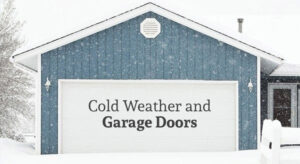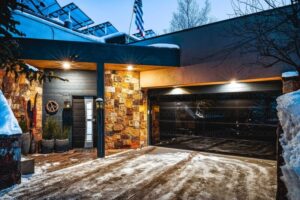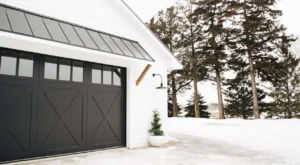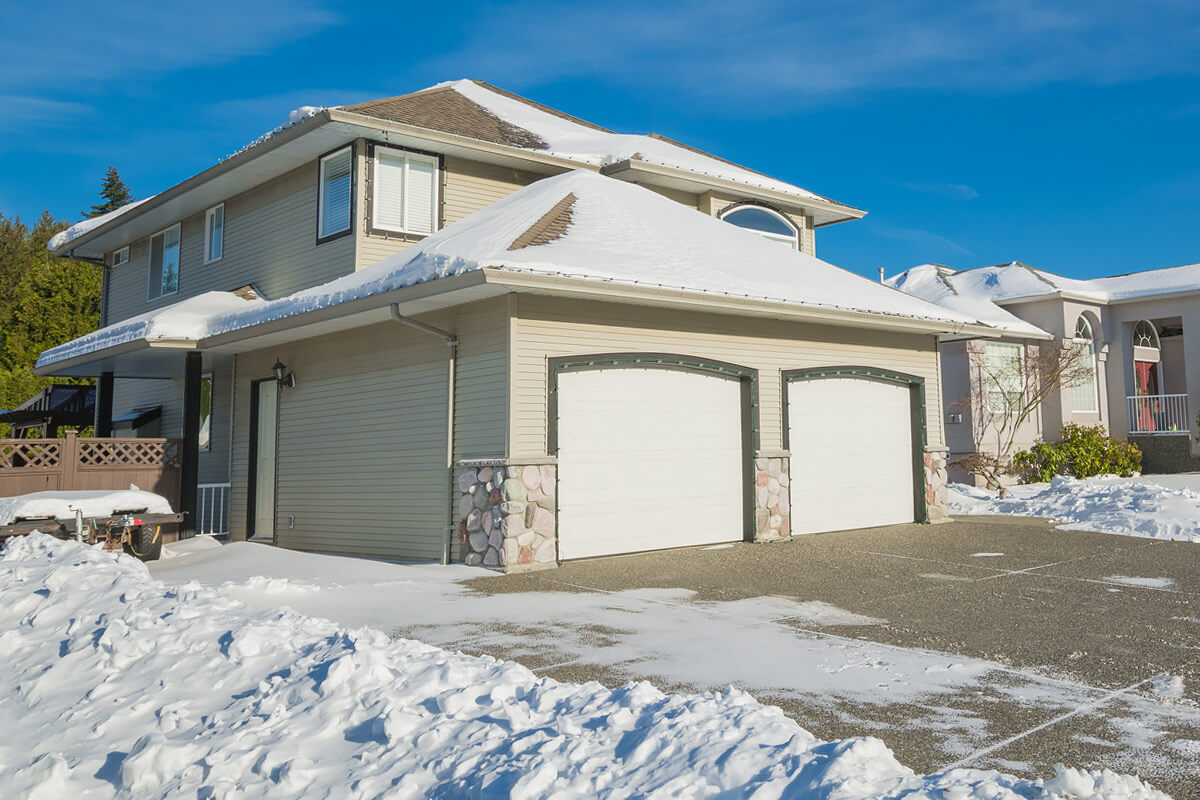
5 Best Garage Doors for Cold Climates That Actually Perform
 Choosing the Right Garage Door for Harsh Winters
Choosing the Right Garage Door for Harsh Winters
If you live in a region with freezing temperatures, snowstorms, and icy winds, investing in high-performance garage doors for cold climates is essential. A well-insulated garage door doesn’t just keep your garage warm—it also protects your vehicle, improves energy efficiency, and prolongs the life of your door system. Many homeowners don’t realize how much heat is lost through a poorly insulated garage. Fortunately, there are durable and thermally efficient options available. In this post, we’ll walk you through the best garage doors for cold climates, their features, and what makes them the right choice.
Insulated Steel Garage Doors: Built to Withstand the Elements
Steel garage doors are some of the most recommended garage doors for cold climates due to their durability and insulation options. When paired with polyurethane or polystyrene insulation, these doors trap heat effectively and reduce drafts, keeping your garage comfortable all winter long.
They’re also resistant to warping and cracking, two common issues in frigid temperatures. Steel models can be customized with different finishes and textures, making them a top pick for modern and traditional homes alike.
Key Benefits:
-
Excellent insulation with multiple R-value options
-
Affordable and widely available
-
Low maintenance and long-lasting
-
Weather-sealed bottom and sides
-
Resistant to wind and snow buildup
-
Compatible with most garage door openers
Insulated steel doors provide a great balance of cost, style, and performance. Many manufacturers offer Energy Star-rated options, enhancing their appeal for energy-conscious homeowners. These are among the best garage doors for cold climates because they maintain garage temperature without heavy HVAC reliance.
Why Material Matters in Cold-Weather Garage Doors
Not all materials perform equally in cold weather. Vinyl and fiberglass garage doors, for example, may become brittle or crack when temperatures plummet. Choosing a door made with cold-resistant materials is crucial for both longevity and function. This is why steel, wood composite, and high-density foam-core doors dominate cold-climate markets.
Insulation types also vary significantly. Polyurethane insulation offers a higher R-value per inch than polystyrene, making it a better option for thermal performance. Knowing these differences can help you select the most efficient garage doors for cold climates that also match your budget and home design.
Garage doors made for winter conditions are designed with enhanced seals, tight joints, and superior insulation. These features can drastically reduce heating costs and improve overall home comfort during the chilliest months.
Fiberglass Garage Doors: Lightweight but Strong
If you want something light yet capable of handling cold weather, fiberglass garage doors are a good alternative. These garage doors for cold climates are resistant to moisture, salt, and corrosion, making them ideal for coastal or snow-prone areas.
These garage doors for cold climates are resistant to moisture, salt, and corrosion, making them ideal for coastal or snow-prone areas.
Fiberglass doors often come with a foam core for insulation. They mimic the look of wood without the upkeep, and their ability to handle freezing conditions makes them a smart option for many homeowners.
Key Benefits:
-
Lightweight and low-maintenance
-
Moisture-resistant and corrosion-proof
-
Can be insulated with polyurethane foam
-
Less likely to warp in cold weather
-
Aesthetic wood-look options available
-
Suitable for both residential and commercial use
While fiberglass isn’t as insulating as steel, modern builds with insulation layers make it viable in cold climates. These doors also expand and contract less than wood, reducing seasonal wear and tear.
Garage Door Design Features for Winter Performance
Beyond materials, it’s critical to consider the design of garage doors for cold climates. Features like thermal breaks, weather seals, and multi-layer construction make a significant difference. Look for doors that include full perimeter sealing systems to prevent cold air from entering and warm air from escaping.
Garage doors with thermal breaks prevent the transfer of cold from the exterior panel to the interior. This keeps your garage warmer and also protects any pipes or appliances stored inside. If energy efficiency and comfort are top priorities, these features are non-negotiable.
Adding bottom seals and threshold weather strips can enhance insulation even further. You can also install a garage heater for additional protection against extreme cold.
Wooden Composite Garage Doors: Classic Looks, Modern Performance
Wooden composite garage doors combine the beauty of wood with the resilience of engineered materials. These garage doors for cold climates offer excellent insulation and stability, even during temperature swings. They won’t warp like traditional wood and can be customized for any architectural style.
These doors are heavier than steel or fiberglass, so they often require a stronger opener. But their appearance and energy efficiency make them a solid investment for homeowners looking to balance aesthetics and function.
Key Benefits:
-
Natural wood appearance without warping
-
High insulation value when paired with foam core
-
Custom design and finishing options
-
Strong against wind and weather
-
Environmentally friendly options available
-
Long-lasting with proper maintenance
Wood composite models are ideal for luxury homes in cold climates. They maintain their look and insulation value year after year, making them a popular option for those who want top performance and curb appeal.
Smart Technology Integration for Winter Convenience
 Smart garage doors offer features that can make winter months more manageable. Many modern garage doors for cold climates come with Wi-Fi openers, temperature sensors, and real-time alerts. These innovations let you manage your door remotely and monitor whether it’s properly sealed—even when you’re not home.
Smart garage doors offer features that can make winter months more manageable. Many modern garage doors for cold climates come with Wi-Fi openers, temperature sensors, and real-time alerts. These innovations let you manage your door remotely and monitor whether it’s properly sealed—even when you’re not home.
This not only improves security but also energy efficiency. You can program your garage door to close at specific times or notify you if it’s left open during a snowstorm. Integrating smart tech can also reduce your heating bill over time.
Wi-Fi enabled systems can even notify you of temperature drops, reminding you to take action before pipes freeze or damage occurs.
Aluminum Garage Doors with Thermal Breaks
Aluminum is not usually the first choice in cold climates, but modern aluminum garage doors now come with insulated panels and thermal breaks, making them competitive. These garage doors for cold climates are rustproof and offer a sleek, contemporary look that suits urban or modern homes.
They are lightweight, making them easier on your garage door opener. With double-pane insulated windows, these doors can maintain heat and resist fog or frost buildup.
Key Benefits:
-
Modern and sleek design appeal
-
Rust and corrosion resistant
-
Thermal break options for better insulation
-
Lightweight but strong
-
Available in multiple finishes and window styles
-
Easy to customize with glass or acrylic panels
Aluminum doors are perfect for homeowners who prioritize design without sacrificing performance. Choose models specifically built for cold weather to ensure year-round usability.
Energy Efficiency and Long-Term Cost Savings
One of the greatest advantages of choosing the right garage doors for cold climates is the long-term energy savings. Well-insulated garage doors reduce the need to overwork your home’s HVAC system. Over time, this translates into lower utility bills and a more comfortable living space.
When temperatures drop, garage heat loss can significantly affect indoor warmth. By investing in a door with a high R-value and weather-resistant construction, you minimize heat leakage and prevent costly repairs due to cold damage.
A proper winter-ready garage door is an energy-smart upgrade that also enhances home value.
Final Thoughts on Choosing the Best Cold-Climate Garage Door
Every homeowner’s needs are different, but selecting from the best garage doors for cold climates can greatly impact comfort, energy efficiency, and door longevity. Whether you prefer the strength of steel, the style of wood composite, or the lightweight nature of fiberglass, there’s a solution that fits your budget and design preferences.
Always look for insulated models with tight seals, and consider upgrading to smart technology for added convenience during winter. By making an informed choice, you’ll protect your garage and home from the harshest elements.
Winter may be unavoidable, but the right garage door makes it manageable.
Need Help Choosing the Right Garage Door?
If you’re not sure which option is best for your home, reach out to the experts at Williams Garage Doors. We specialize in recommending and installing the most reliable garage doors for cold climates in Pennsylvania and New Jersey.
📞 Call us in PA at 215-792-4424
📞 Call us in NJ at 856-606-2937
📧 Email us at williamsgaragedoors1@gmail.com
🌐 Visit: https://williams-garagedoors.com/
For more information on garage door safety and standards, check out resources from the International Door Association (IDA) and the U.S. Consumer Product Safety Commission (CPSC).



